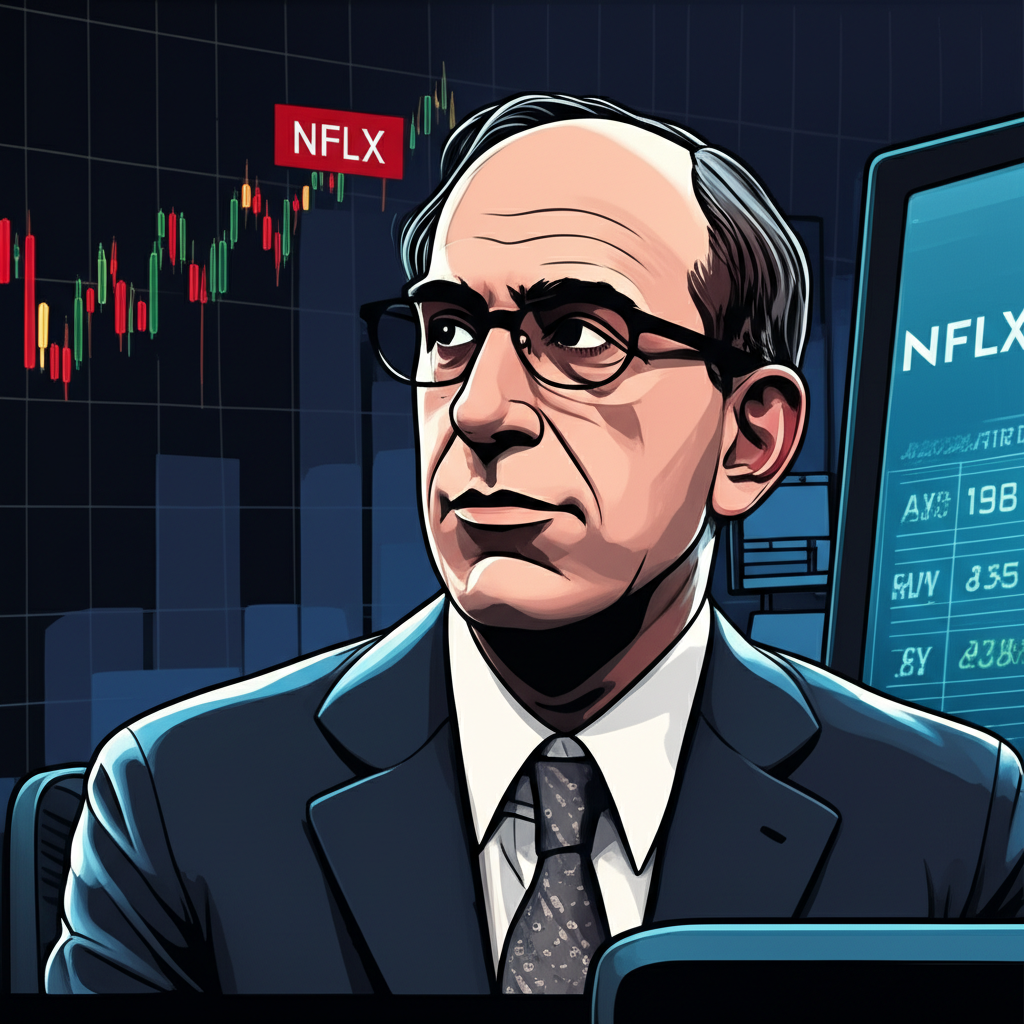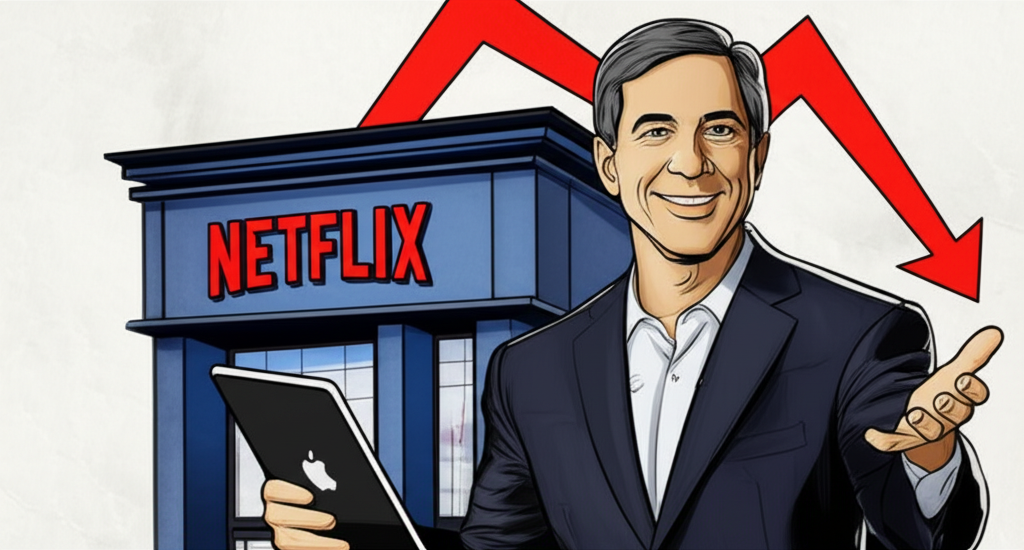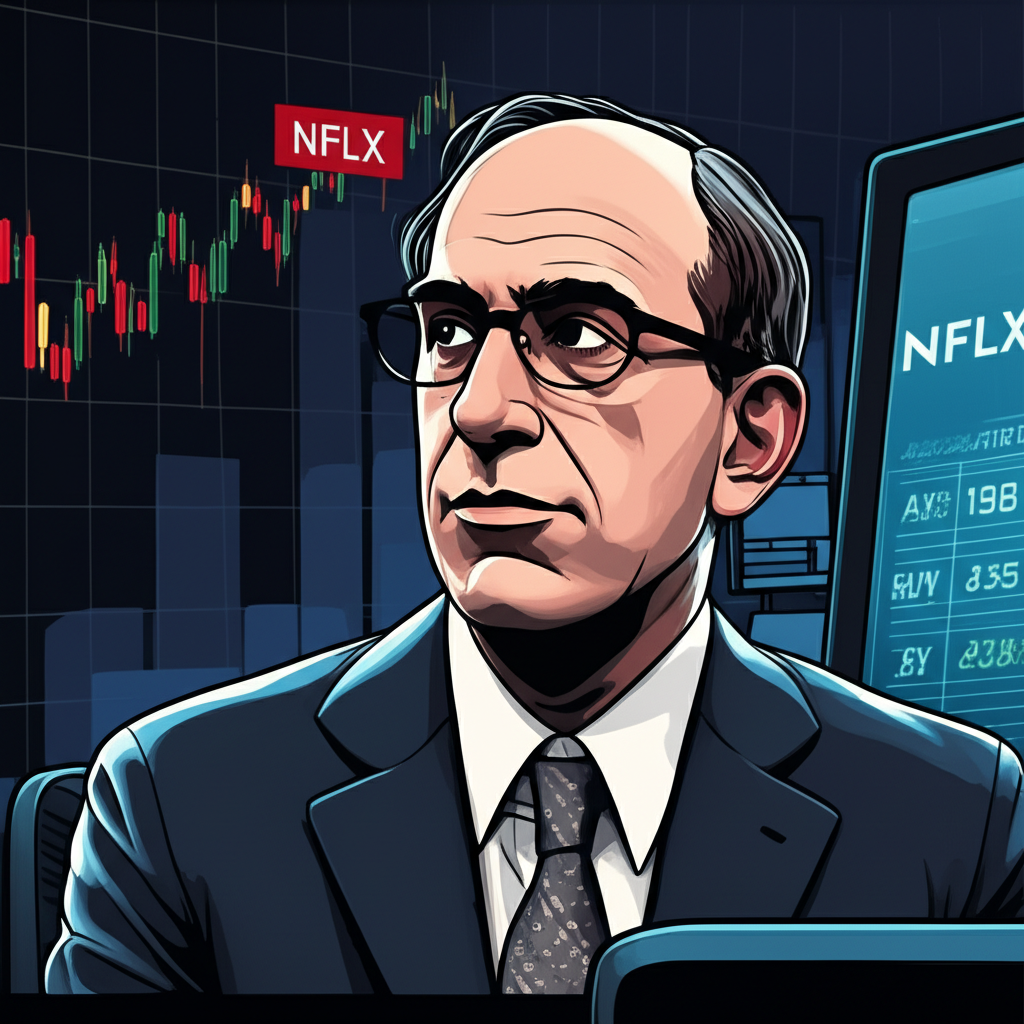Introduction: The High-Stakes World of Bill Ackman and Netflix

Bill Ackman, the prominent hedge fund manager behind Pershing Square Capital Management, is no stranger to bold market moves. His investment decisions often reverberate across Wall Street, drawing scrutiny from analysts, institutional investors, and retail traders alike. In early 2022, Ackman made headlines with a high-profile entry into Netflix (NFLX), a company at the epicenter of the global streaming revolution. What began as a calculated bet on one of the most recognizable brands in digital entertainment quickly unraveled into one of the most discussed investment reversals of the decade. This article unpacks the full trajectory of Ackman’s short-lived but impactful stake in Netflix—how it began, why it ended, and what it reveals about risk, timing, and conviction in modern investing. We’ll examine the financial consequences, the strategic rationale behind his exit, and how this episode fits into both Netflix’s evolving business model and Ackman’s broader investment philosophy.
The Timeline of Bill Ackman’s Netflix Investment
Initial Buy-In: Pershing Square’s Strategic Entry

In late January 2022, Pershing Square Capital Management disclosed a major new position in Netflix, purchasing over 3.1 million shares and securing a spot among the company’s top 20 shareholders. The accumulation began on January 21, immediately following a sharp drop in Netflix’s stock price after its Q4 2021 earnings report missed expectations. At the time, many investors panicked, but Ackman saw opportunity. He publicly affirmed his confidence in Netflix’s long-term durability, praising its resilient revenue model, global scale, and unmatched content library. He emphasized that the company possessed “highly recurring revenues, a business model that is difficult to replicate, and the potential for significant future growth”—a clear signal that this wasn’t a speculative trade, but a core holding backed by deep due diligence. For Ackman, Netflix’s temporary stumble created a rare window to invest in a dominant player at a discounted valuation.
Netflix’s Tumultuous Q1 2022 and Subscriber Shock

Just months after Ackman’s entry, the narrative shifted dramatically. On April 19, 2022, Netflix delivered its Q1 earnings, revealing an unexpected loss of 200,000 subscribers—the first quarterly decline in over a decade. The market reacted swiftly and harshly, sending the stock into freefall and wiping out billions in market value. The decline was attributed to multiple factors: intensifying competition from Disney+, HBO Max, and other streaming platforms; widespread password sharing that diluted revenue potential; and the company’s decision to suspend operations in Russia due to geopolitical tensions. These headwinds combined to shake investor confidence, raising fundamental questions about Netflix’s ability to sustain growth in a saturated and increasingly competitive landscape. For Pershing Square, which had built its thesis on predictable, long-term expansion, the sudden uncertainty was a red flag.
The Financial Impact: How Much Did Bill Ackman Lose on Netflix?
Quantifying the Loss: Figures and Market Reaction

Faced with deteriorating fundamentals and mounting volatility, Bill Ackman made a decisive move. On April 20, 2022—just one day after the earnings shock—Pershing Square announced it had completely sold its entire Netflix stake. The rapid divestment marked a stark departure from Ackman’s usual long-term posture and signaled a full abandonment of the investment thesis. Estimates indicate the trade resulted in a loss of approximately $435 million, a substantial hit even for a fund of Pershing Square’s caliber. The speed of the exit surprised many in the financial community, where Ackman is known for patient, activist-style investments. His sudden retreat amplified concerns about Netflix’s future and added to the bearish sentiment in the broader tech and streaming sectors during a period of macroeconomic uncertainty.
Hypothetical Gains: What If Ackman Had Held Netflix Shares?
The financial sting of the loss is magnified by what might have been. Had Ackman retained the shares through the turbulence, the outcome could have been dramatically different. After bottoming out in mid-2022 around $180 per share, Netflix began a strong recovery driven by operational improvements and new revenue initiatives. By early 2024, the stock had climbed above $500, representing more than a 150% increase from its lows. This rebound underscores the peril of mistaking cyclical volatility for structural decline. While the subscriber drop in 2022 was alarming, Netflix’s underlying business proved adaptable. The missed opportunity highlights a critical challenge in investing: distinguishing between temporary setbacks and permanent damage. For Pershing Square, the cost of caution may have been far greater than the cost of holding.
Bill Ackman’s Rationale for Selling Netflix Shares
Pershing Square’s Official Statement and Investment Thesis Shift
In an investor letter dated April 20, 2022, Ackman provided a transparent explanation for the sale. While he maintained that Netflix still had a fundamentally strong business, he acknowledged that the company’s recent performance and forward guidance had introduced too much uncertainty. He noted that Netflix’s “high degree of operating leverage” meant small changes in subscriber trends could lead to large swings in profitability, making future cash flows harder to model with confidence. In his words, it had become “difficult to predict Netflix’s future prospects with a sufficient degree of certainty.” This erosion of predictability, rather than a complete rejection of the business, was the driving force behind the exit. For more details on this rationale, see Pershing Square’s official announcement from that date.
Contrasting with Ackman’s Long-Term Investment Philosophy
The Netflix episode stands out as an outlier in Ackman’s investment track record. Historically, he has favored concentrated, long-duration bets—such as his decade-long holding in Canadian Pacific Railway or his activist campaign at Chipotle—where he actively engages with management to unlock value. These positions are typically held for years, reflecting a philosophy rooted in deep conviction and operational influence. The Netflix trade, lasting barely three months, deviated sharply from that pattern. There was no activist push, no board engagement, and no effort to influence strategy. Instead, it was a pure market bet based on valuation and growth expectations. When those expectations faltered, Ackman prioritized risk containment over philosophical consistency, choosing portfolio protection over patience.
Broader Market Context and Netflix’s Evolving Landscape
The Streaming Wars and Post-Pandemic Normalization
Netflix’s 2022 downturn must be understood within the broader context of the streaming industry’s transformation. During the pandemic, stay-at-home orders fueled explosive subscriber growth across all platforms. But as lockdowns ended, demand plateaued. Consumers began reevaluating their subscriptions, leading to widespread churn—a phenomenon dubbed “subscription fatigue.” At the same time, legacy media giants like Disney, Warner Bros. Discovery, and Paramount+ aggressively entered the fray, spending heavily on content to capture audience share. This escalation—the so-called “streaming wars”—increased content costs, compressed margins, and fragmented viewership. For Netflix, which had long enjoyed first-mover advantage, the new landscape required a strategic reset. The environment Ackman faced was not just about one company’s stumble, but an entire sector adjusting to a post-pandemic reality.
Netflix’s Path Forward: Advertising and Password Sharing Crackdown
In response to its challenges, Netflix pivoted with aggressive new strategies—many of which were implemented after Ackman’s exit. In November 2022, the company launched an ad-supported subscription tier, Netflix Basic with Ads, targeting price-sensitive users and opening a new revenue stream. Simultaneously, it began cracking down on password sharing, a practice that had allowed tens of millions of non-paying households to access the service. These measures, once considered risky or brand-diluting, have since proven effective. By early 2024, Netflix reported consecutive quarters of subscriber growth and improved profitability, demonstrating the company’s capacity to innovate under pressure. These developments, while not part of Ackman’s original thesis, now form the foundation of Netflix’s next growth phase.
Key Lessons for Investors from the Bill Ackman Netflix Bet
The Importance of Conviction and Adaptability
Ackman’s Netflix trade offers a masterclass in the tension between conviction and adaptability. He entered with strong belief, grounded in rigorous analysis. But when new data emerged that undermined key assumptions—particularly around subscriber predictability—he chose to adapt rather than persist. This highlights a crucial truth: even the best research can’t eliminate uncertainty. Markets evolve, consumer behavior shifts, and competitive dynamics change. Successful investors aren’t those who never make mistakes, but those who recognize when their thesis is breaking and respond with discipline. Ackman’s swift exit, while costly, avoided potentially deeper losses and preserved capital for better opportunities.
Risk Management in High-Conviction Trades
The episode also underscores the importance of risk control, especially in concentrated portfolios. Ackman’s strategy often involves large, high-conviction bets, which can generate outsized returns but also expose the fund to significant drawdowns when bets go wrong. The Netflix loss—$435 million in a matter of weeks—serves as a reminder that no single position should jeopardize overall portfolio stability. Even with thorough due diligence, external shocks can derail even the most logical investment case. Establishing clear risk thresholds, monitoring key indicators, and having predefined exit criteria are essential practices, particularly when investing in high-growth, high-multiple stocks subject to rapid sentiment shifts.
Conclusion: The Enduring Legacy of a High-Profile Trade
Bill Ackman’s brief foray into Netflix remains one of the most scrutinized investment decisions of recent years. It wasn’t a failure of analysis, but a collision between a well-reasoned thesis and an unpredictable market shift. What started as a vote of confidence in a resilient business ended as a case study in risk management and decision-making under pressure. While the financial loss was significant, the broader implications are more instructive. In an era defined by volatility, disruption, and rapid information flow, even the most seasoned investors must balance long-term vision with tactical flexibility. The Netflix trade didn’t break Ackman’s record—it refined it. And for investors watching closely, it offered a rare glimpse into how conviction, caution, and course correction intersect in real time.
Frequently Asked Questions About Bill Ackman and Netflix
1. Did Bill Ackman profit from his Netflix investment?
No, Bill Ackman’s Pershing Square Capital Management did not profit from its Netflix investment. The hedge fund incurred an estimated loss of approximately $435 million.
2. When did Bill Ackman buy and sell Netflix stock?
Bill Ackman began accumulating Netflix shares around January 21, 2022, and sold his entire stake on April 20, 2022, following Netflix’s disappointing Q1 2022 earnings report.
3. What was Bill Ackman’s stated reason for selling Netflix shares?
Ackman stated that while he still believed in Netflix’s business model, the company’s recent subscriber numbers and future outlook made it “difficult to predict Netflix’s future prospects with a sufficient degree of certainty,” leading to an unacceptable level of risk for his portfolio.
4. How much money did Bill Ackman lose on Netflix?
Pershing Square Capital Management lost approximately $435 million on its Netflix investment.
5. Does Bill Ackman currently own Netflix shares?
No, Bill Ackman’s Pershing Square Capital Management sold all of its Netflix shares in April 2022 and has not publicly disclosed any subsequent re-investment in the company.
6. What is Pershing Square’s current stance on the streaming industry?
Pershing Square has not made any public statements indicating a current investment in other streaming companies. Their swift exit from Netflix suggests a cautious approach to the sector’s predictability, though their long-term view on the industry’s potential for winners may evolve.
7. How did Netflix’s stock perform after Ackman’s exit?
After Ackman’s exit and a further decline in mid-2022, Netflix’s stock staged a significant recovery. By early 2024, shares had more than doubled from their 2022 lows, driven by new strategies like ad-supported tiers and password sharing crackdowns.
8. What lessons can investors learn from Bill Ackman’s Netflix trade?
Key lessons include:
- The importance of conviction but also adaptability when an investment thesis changes.
- The necessity of robust risk management, even in high-conviction trades.
- Even top investors can make mistakes or face unforeseen market shifts.
9. Who are the biggest institutional owners of Netflix stock today?
As of recent filings, major institutional owners of Netflix stock include large asset managers like The Vanguard Group, BlackRock Inc., and Capital Research Global Investors, among others, reflecting its status as a prominent component in many diversified portfolios. Information on specific holdings can be found on financial data platforms or Netflix’s investor relations website.
10. How does the Netflix investment compare to Bill Ackman’s Herbalife bet?
The Netflix investment differs significantly from Ackman’s Herbalife bet. The Herbalife short position was a multi-year, highly public activist campaign where Ackman argued the company was a pyramid scheme. In contrast, Netflix was a quick long position taken after a dip, based on a growth thesis, and exited rapidly when that thesis became unpredictable. While both involved substantial capital, Herbalife was a deep, protracted battle, whereas Netflix was a swift, pragmatic risk-reduction move.

留言